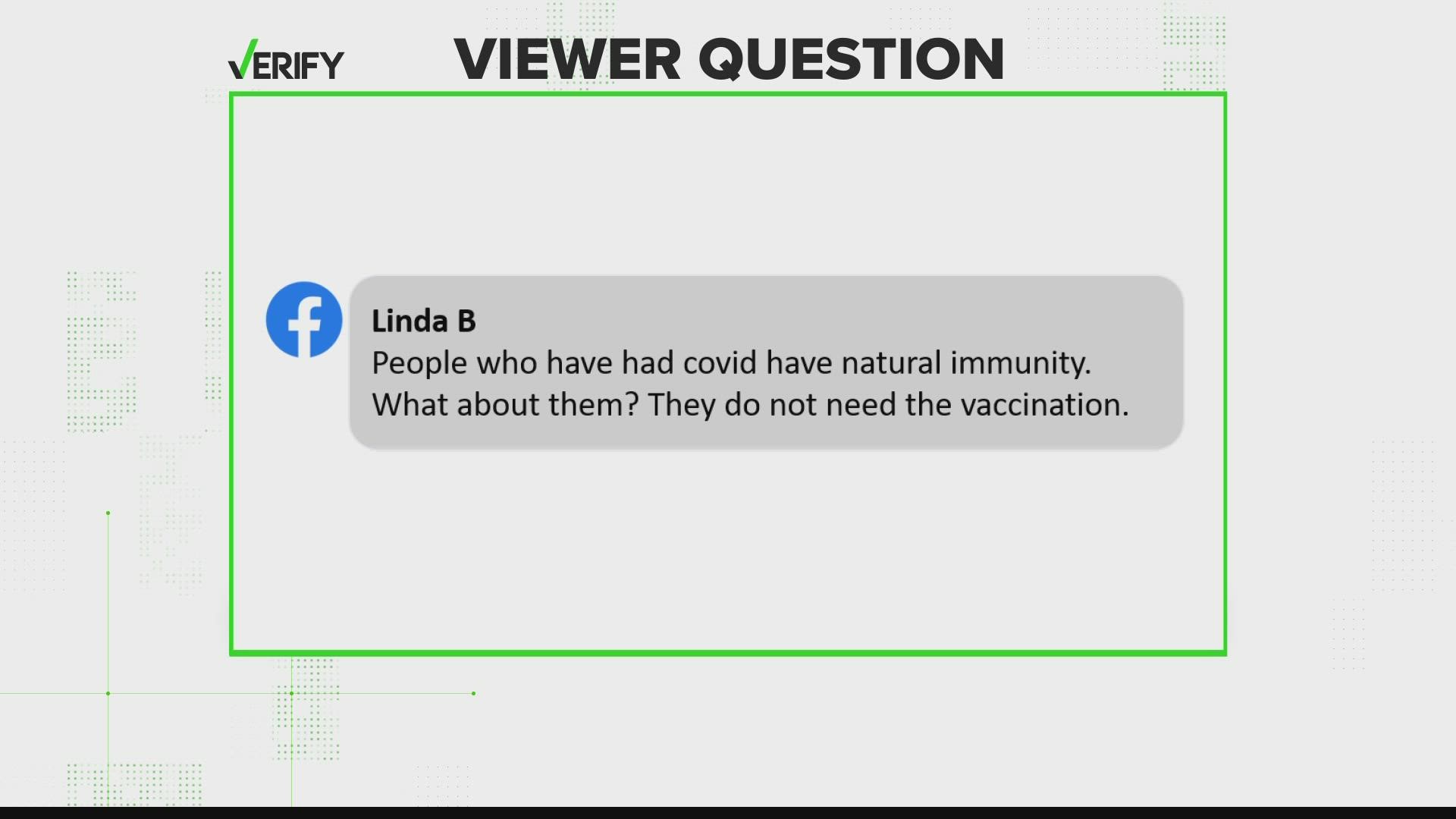As new COVID-19 cases and hospitalizations climb, public health officials and politicians alike are encouraging everyone able and eligible to get vaccinated if they aren’t already.
But what if you’ve already had COVID-19 and recovered, asked 10 Tampa Bay viewer Linda K. on Facebook. With natural immunity, she said, you don’t need to get vaccinated.
According to a new Gallup survey, one of the main reasons Americans cite for not planning to get vaccinated is the belief that they’re protected since they already had COVID-19.
THE QUESTION
Linda K. asked: What about people who’ve recovered from COVID-19 and have natural immunity? Do they need the vaccine, too?
THE SOURCES
- The Centers for Disease Control & Prevention (CDC)
- World Health Organization (WHO)
- Dr. Nicole Iovine, Division of Infectious Diseases & Global Medicine at the University of Florida
THE ANSWER
Yes, even if you’ve already had COVID-19 it's recommended you still get the vaccine in order to have the most protection.
WHAT WE FOUND
The World Health Organization says: “Take whatever vaccine is made available to you first, even if you have already had COVID-19. It is important to be vaccinated as soon as possible once it’s your turn and not wait. Approved COVID-19 vaccines provide a high degree of protection against getting seriously ill and dying from the disease, although no vaccine is 100% protective.”
The CDC also recommends people who already had COVID-19 get vaccinated. A study published last week by the agency found COVID-19 survivors who never got vaccinated were more than twice as likely to get reinfected than those who were fully vaccinated.
Dr. Nicole Iovine, an epidemiologist with the University of Florida’s Division of Infectious Diseases and Global Medicine, said while people who’ve recovered from COVID-19 have some level of natural immunity it’s not as robust or as long-lasting as immunity from the vaccine.
Additionally, natural immunity from an earlier infection isn't as strong as the virus evolves, she said.
“When you have natural infection with COVID your body will make an immune response to all parts of the virus – and while that sounds really good the problem is that only a small fraction of those antibodies are actually going to protect you against re-infection,” she said.
Whereas the vaccine is designed to help your immune system respond to the specific part of the virus – the spike protein – that ultimately enables it to infect you and make you sick.
“So, vaccination allows you to make a very focused, very strong response against that part of the virus,” she said.
The amount of natural immunity can vary from person to person, potentially depending on severity of the initial infection. A study published Friday from Rush University found four of 29 previously infected people had no detectable antibodies before they were vaccinated — and the vaccines worked for them just like they work for people who never had COVID-19.
There is a study – a small one – published by the Cleveland Clinic in June that concluded people who’d already had COVID-19 may not necessarily benefit from being vaccinated.
But even the Cleveland Clinic has a statement included with its findings still recommending that eligible people get the shot.
RELATED: Yes, it is legal for an employer to require vaccinated and unvaccinated workers to be separated
Most researchers agree it’s the best and safest option for now until we have more concrete answers. While the shots aren’t perfect, they are providing strong protection against hospitalization and death even from the delta mutant, according to Iovine.
“The safest thing to do is protect yourself as much as possible,” Iovine said. “You don’t want to be in a scenario where you think you’re protected because you had natural infection when, in fact, your antibody levels may have dropped tremendously."

